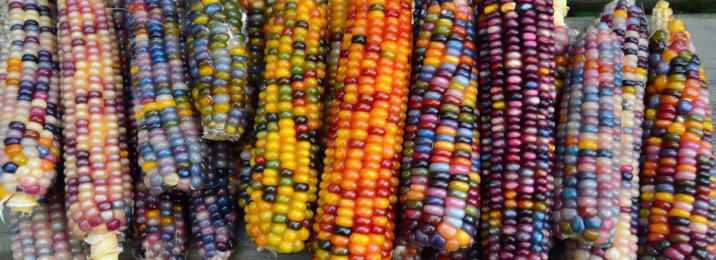Mexico Designates Native Corn as Part of Its Cultural Heritage
Mexico Designates Native Corn as Part of Its Cultural Heritage
Mexico’s Senate has just passed a new and somewhat controversial federal law to promote and protect the country’s native corn. Maize cultivation is Mexico’s most significant and successful commodity, which dates back to over 10, 000 years ago. In Mexico corn is not only a commodity, but it is something that’s deeply rooted within the country’s culture and heritage.
Mexicans often refer to themselves as the ‘children of corn,’ descendants of those whose religious beliefs included three corn gods. As the Egyptians carved images of crops and bread on their hieroglyphic tablets, so too can the humble corn cob be found throughout ancient Mexican art.
Today, maize production continues to be an integral part of Mexico’s rural farming communities. And, most importantly, corn forms the basis of the country’s diet and Mexican culinary traditions. In fact, corn can be found in over 600 traditional Mexican dishes, from enchiladas and quesadillas to tacos and tamales.
How Did This New Law Come To Be?
The passing of the law came before the implementation of the USMCA, the new trade agreement between the United States, Mexico, and Canada, which will replace NAFTA. Previously NAFTA allowed large quantities of cheaper, foreign corn, primarily from the US, into Mexico. These low-cost producers sell corn for about half of the price of Mexico’s native corn. Sadly, as a result, Mexico produces only a fraction of the corn it consumes.
Amongst other objectives, the new bill seeks to preserve and help native Mexican corn varieties against competition from modern hybrids and genetically modified corn. As one supporter of the new bill states, the recent law will help prevent the “intellectual plundering” of Mexico’s indigenous communities.
Moving forward, all corn produced and sold in Mexico will need to be properly labeled to indicate exactly how it has been produced.
What Sets Native Corn Apart From Hybrid & GMO Corn?
Below we take a closer look at native, hybrid and GMO corn, and what makes each of them different:
Both genetically modified corn and modern hybrid varieties are seen as a concern because of the possibility that foreign companies would patent seed varieties that were already developed under traditional Mexican agriculture.
The new law also seeks to address another concern, which is the contamination of native varieties by crossing-breeding them with foreign, genetically modified corn.
The Promise of Producing Quality Corn
Victor Manuel Chima of the Fray Francisco de Vitoria Human Rights Center calls such a possibility a “… a kind of intellectual plundering of [indigenous] communities.”
Chima stated that despite the new law Mexican native corn is still in danger because the communities that grow these varieties “have been marginalized for many years.”
He said, “With this law, we will look to replace the importation of tons of corn from the United States with the development of public policies to guarantee production, not only for consumption, but also to guarantee that this corn is nutritious and of quality.”
At Benito’s, we’re all for this new law. Here’s to Mexico promoting and protecting their country’s precious Mexican native corn, and reclaiming an integral part of their culture and heritage!






